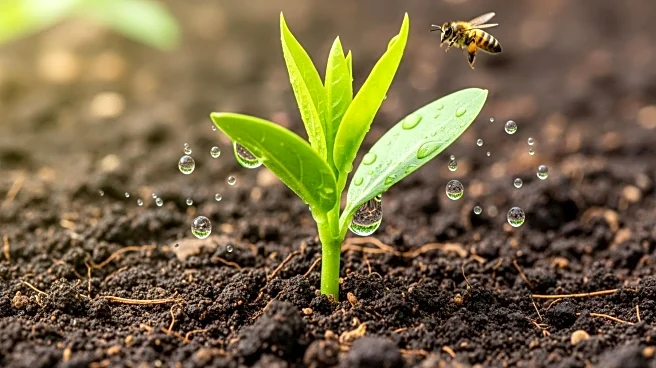What's Happening?
The Biological Agri Solutions Association of India (BASAI) is organizing a two-day national conference titled 'Biologicals for Sustainable Agriculture – A Climate Resilient Approach' on September 22-23, 2025, at Habitat World, India Habitat Centre, New Delhi. The conference aims to address the challenges posed by climate change and soil degradation, focusing on practical solutions such as bio-stimulants, biofertilizers, and biopesticides. Key figures from the government and the agri-biological industry, including Maninder Kaur Dwivedi, Dr. P.K. Singh, and Priya Ranjan, will participate in the event. BASAI plans to release four new publications on innovations in biological agriculture during the conference.
Why It's Important?
The BASAI 2025 conference is significant as it seeks to equip Indian farmers with sustainable agricultural practices that can mitigate the impacts of climate change. By focusing on bio-based solutions, the conference aims to enhance the resilience of agriculture, which is crucial for food security and environmental sustainability. The involvement of policymakers and industry leaders underscores the importance of collaborative efforts in advancing climate-smart farming practices. This initiative could lead to increased adoption of biologicals in agriculture, potentially reducing reliance on chemical inputs and promoting eco-friendly farming.
What's Next?
The conference is expected to foster discussions on various themes, including residue-free food, women's leadership in agri-biologicals, and fertilizer use efficiency. The exhibition will showcase innovations from industry players, potentially leading to new partnerships and advancements in the field. The outcomes of the conference may influence future agricultural policies and practices in India, encouraging a shift towards more sustainable and resilient farming methods.
Beyond the Headlines
The BASAI 2025 conference highlights the growing recognition of biologicals as a viable solution to agricultural challenges. This shift towards sustainable practices reflects broader global trends in agriculture, emphasizing the need for environmentally friendly approaches. The focus on women's leadership in agri-biologicals also points to efforts in promoting gender equality within the industry, which could have long-term social and economic benefits.










